Alpha-lipoic acid is one of the fatty acids from the mitochondrial family of fatty acids that fights against inflammation and oxidation. Synthesized in the human body, you can consume alpha-lipoic acid by eating meat and also some vegetables and fruits (1).
As a supplement it has shown great benefits when it comes to fighting against inflammation and oxidation. There are also added benefits of the supplement that help in protection of the body against liver diseases, heart disease, neurological decline that tends to happen with age and diabetes.
Research
Rankings
1. Nutricost Alpha Lipoic Acid
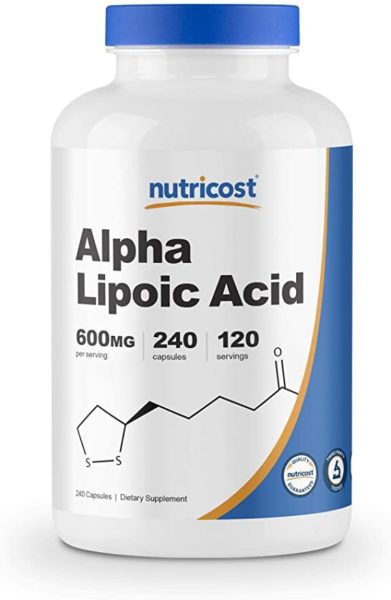
This high-quality ALA supplement provides the 600 mg standard most people will be looking for. Each bottle is third-party tested to ensure overall quality no matter what.
You also get 240 capsules for a very reasonable asking price, meaning you’ll be able to take these daily supplements for almost an entire year before you need to make another purchase. BodyNutrition’s #1 choice.
2. Nature’s Bounty Alpha Lipoic Acid
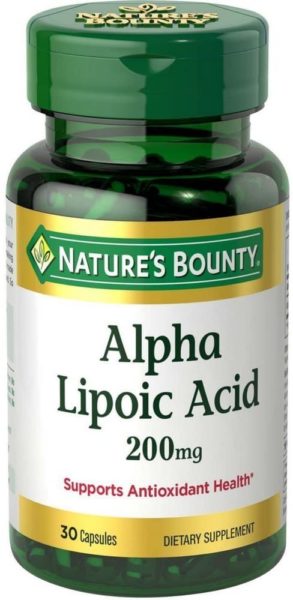
Nature’s Bounty ALA supplement is another great choice thanks to its affordability and low concentration of ALA. We recommend it if you don’t need the full 600mg most brands include, but still want to reap the benefits of this powerful antioxidant.
While they aren’t the most potent on the market, they’re still a great choice for short-term pain relief or if you’re on a tight budget.
3. Pure Encapsulations Alpha Lipoic Acid
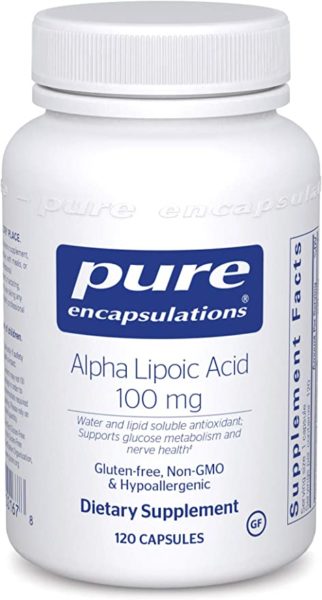
Pure Encapsulations ALA provides one of the lowest concentrations of ALA on the market – ideal for the carnivores reading this.
Where it really shines is in purity, containing only hypoallergenic ingredients and ruthlessly third party lab tested.
4. Superior Labs Alpha Lipoic Acid
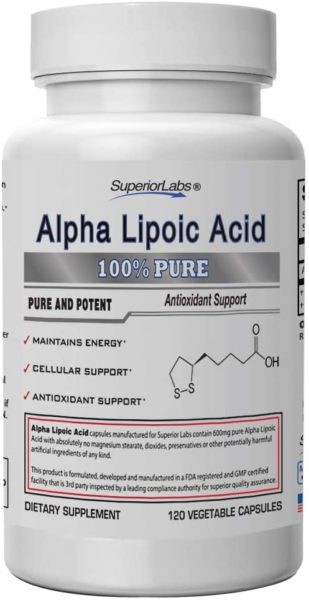
This 100% pure alpha-lipoic acid supplement comes in a bottle of 120 and is produced with unquestionable quality.
It’s also NSF certified, which is one of the highest quality manufacturing assurance organizations in the entire supplement industry.
5. Now Supplements Alpha Lipoic Acid
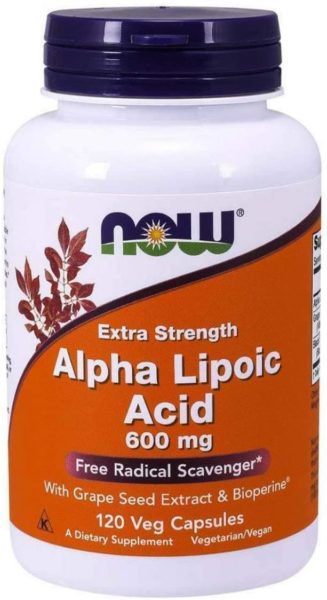
Most ALA supplements don’t include extra ingredients, which can be either good or bad – depending on what’s included.
Thankfully, these capsules are made with grape seed extract and Bioperine, which enhance the antioxidant power and provide ancillary benefits.
6. Best Naturals Alpha Lipoic Acid
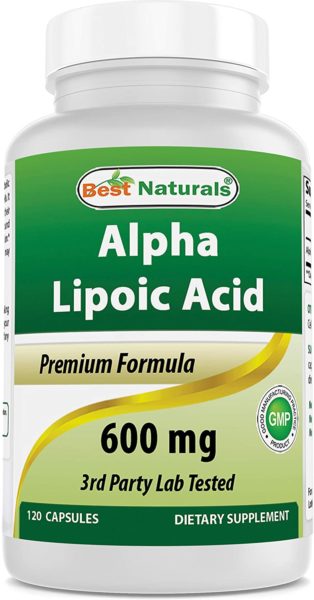
This ALA supplement comes in a bottle of 120 for a very reasonable asking price. Furthermore, these capsules are made in a GMP-certified facility , ensuring their quality and ingredient purity.
7. Doctor’s Best Alpha Lipoic Acid
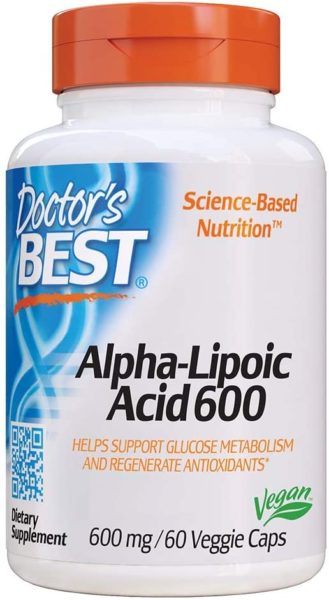
Doctor’s best provides a good short term dose of ALA for specific needs, like pre-diabetic treatment or relief from various painful conditions.
8. Jarrow Formulas Alpha Lipoic Supplements
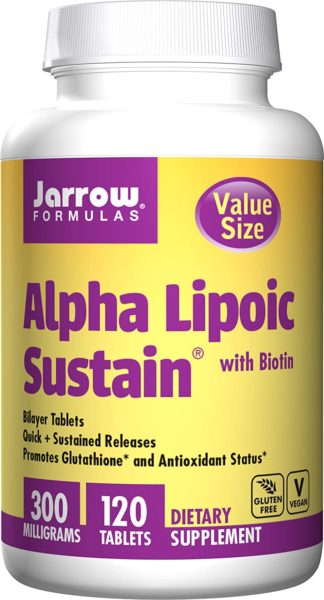
This alpha-lipoic acid supplement comes in bi-layer capsules, meaning that you’ll get a quick boost of ALA into your system with a more sustained release coming about a thirty minutes later.
This makes them great for short-term pain relief.
9. Source Naturals Alpha Lipoic Acid
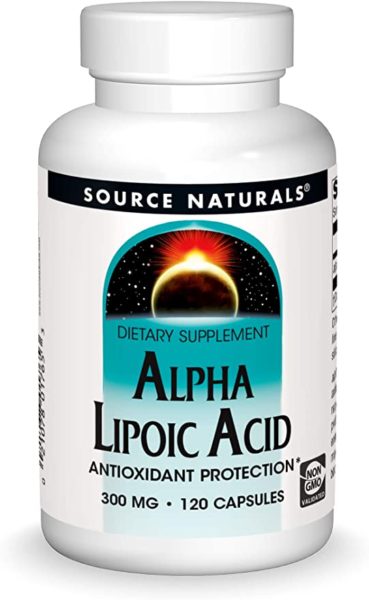
Source Naturals’ ALA supplement comes in concentrations of 300 mg, offering a nice middle ground between 100 and the typical 600.
It’s also super affordable and is manufactured right in the USA for added quality control.
10. Amazing Nutrition Alpha Lipoic Acid
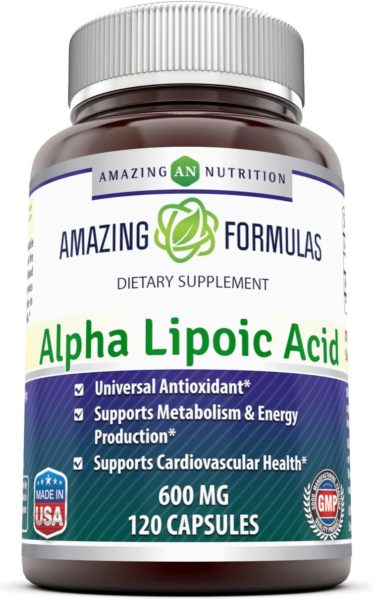
This ALA supplement comes in 600 mg per serving and is ideal for a wide variety of diets. These capsules are also free of any artificial colors, preservatives or other ingredients.
Amazing Nutrition products are made in the USA for guaranteed purity and potency.
Category winners
Best alpha-lipoic acid overall: Nutricost Alpha Lipoic Acid
The powerful dose and simple composition of Nutricost Alpha Lipoic Acid propel it to our top overall spot. At 600 mg per capsule, it has a market-leading dosage, which makes it well-suited for a broad variety of applications, including fighting oxidative damage, healing nerve pain, and supporting metabolic health.
Best alpha-lipoic acid for nerve pain: Nutricost Alpha Lipoic Acid
Research on using alpha lipoic acid for tingling, burning, and other types of nerve pain typically uses dosages of several hundred milligrams of ALA, so the 600 mg dose of Nutricost is perfectly suited for this application.
Best alpha-lipoic acid for heart health: Nature’s Bounty Alpha Lipoic Acid
Nature’s Bounty has a nice, middle-of-the-road dosage that’s a good fit if you’re looking to keep your antioxidant levels elevated over the long-term for promoting heart health. Add to that the lack of any other active ingredients and it’s a great fit if you’re taking ALA for heart health.
Best alpha-lipoic acid for fertility: Pure Encapsulations Alpha Lipoic Acid
Though it’s a niche application, some people rely on the antioxidant power of alpha lipoic acid as part of a fertility-boosting supplementation strategy. If that’s what you’re looking for, we recommend Pure Encapsulations thanks to the flexibility in dosage that you get with its 100 mg dosage and the ultra-pure formulation, which ensures that this supplement is compatible with a variety of other fertility supplements.
Best alpha-lipoic acid for metabolic health: Nutricost Alpha Lipoic Acid
Alpha lipoic acid is a popular supplement for supporting insulin function and overall metabolic health. For this application, we like Nutricost Alpha Lipoic Acid because of its high dosage that matches that used in scientific research on ALA supplementation for type II diabetes.
Best alpha-lipoic acid for skin: Pure Encapsulations Alpha Lipoic Acid
Alpha lipoic acid’s powerful antioxidant capabilities make it a popular supplement for fighting aging and oxidative damage to skin. For this application our favorite is Pure Encapsulations Alpha Lipoic Acid, whose more modest dosage keeps the potential for any off-target effects of the supplement lower while still delivering antioxidants to the body.
Who should buy alpha-lipoic acid?
Alpha-lipoic acid is a type of antioxidant, which means that it helps to reduce free radical molecular damage across the body. ALA is currently used in Europe as a pain relief supplement – so it might be a good alternative supplement instead of other products like light opioids, which carry a much higher likelihood of addiction and other health risks.
Diabetics should strongly consider taking an ALA supplement because plenty of evidence to suggest that alpha-lipoic acid can be a worthwhile supplement to support type II diabetes. Specifically, studies show that ingesting significant levels of ALA can improve your insulin resistance.
ALA supplements are also known to reduce symptoms of painful conditions or treatments, prickling in the feet or legs, tingling, and more. Because ALA supplements can be taken either orally or through intravenous methods, they can be a great supplement choice if you have type II diabetes or are generally sensitive to insulin levels.
You should still speak with your doctor before taking an ALA supplement, as ALA can interact with several medications and cause harmful side effects. This is especially important if you are pregnant or nursing. Due to the lack of research, children should avoid ALA supplements unless otherwise directed by a healthcare professional.
How we ranked
One of the most important factors of ALA supplements is purity. In the supplement world, one has to be careful about supplements that are misrepresented or otherwise advertised with effects they don’t actually have. Not only is this a waste of money, but it can also be dangerous depending on the ingredients involved.
All of the top choices above, like Nutricost, have capsules that are third-party tested for both purity and potency. That means that organizations not connected to the manufacturer (and who thus have nothing to lose if the pill doesn’t work) tested the capsules themselves to make sure that their ALA content was legitimate and that the capsules provided real benefits to their users.
Superior Labs is also NSF certified, meaning that their manufacturing center is tightly controlled for quality and is very well sanitized, ensuring that none of their ingredients are compromised before they make it into the bottles. This was a major reason why it made our top 5.
Next, we looked for added ingredients. The vast majority of ALA supplements on the market contain only ALA in a veggie capsule. But some, like Now Supplements ALA, contain extra nutritional benefits in the form of grape seed oil and Bioperine. This helps to enhance both the potency and the absorption of the product.
Lastly, we looked at the dosage. While the standard dose of ALA is 600mg, we preferred products that were in the lower 100-200mg range. This is because a lot of people naturally consume a healthy amount of ALA in their diet – making high dosage supplements unnecessary (and possibly even dangerous in the long run).
Benefits
Alpha-lipoic acid can be beneficial for diabetics. Taking ALA intravenously or orally seems to improve blood sugar levels in people who have diabetes.
Evidence also suggests that taking 600 mg of ALA intravenously can decrease the level of blood sugar that tends to rise after meals. Because alpha-lipoic acid can cause a lowering of blood sugar level, people with diabetes taking alpha-lipoic acid should keep a constant check on the level of blood sugar in their body.
When alpha-lipoic acid is taken orally, it can improve symptoms such as numbness, pain, and burning in the arms and legs of people who have diabetes. The symptoms need a period of about 3-5 weeks to show signs of improvement (2).
ALA can provide some benefits to your skin’s health and appearance by raising the levels of other antioxidants. In conjunction with these other molecules like glutathione, it’s possible that ALA can reduce the signs of aging significantly. As your skin suffers less free radical molecular damage, it’ll accrue wrinkles and other signs of aging less frequently over time.
A 2010 review of the effects of antioxidants (and how alpha-lipoic acid affects them) discovered that high antioxidant levels in the body were positively correlated with younger-looking skin and lower incidences of wrinkles (3).
Alpha-lipoic acid can slow the progression of Alzheimer’s disease. Alzheimer’s disease and other memory affecting issues (like general memory loss or cognitive decline) are often associated with inflammation and free radical molecular damage. As an antioxidant, ALA can neutralize these effects to some extent.
A 2008 review of two studies involving dozens of patients found that ALA doses given daily produced positive effects in regard to Alzheimer’s progression in general neurological decay. Specifically, inflammation of the brain was found to be reduced, as ALA can significantly lower oxidative stress and plaque loads in brain tissues and throughout the body (4).
Alpha-lipoic acid may play a role in weight loss. One of the main benefits of taking alpha-lipoic acid is the weight loss tendency it has. Taking ALA daily at doses of 1800mg for 20 weeks can help in the reduction of weight.
Alpha-lipoic acid can help improve complete systemic health, by preventing damage to certain kinds of body cells. ALA is also known to be helpful for the body as it helps in the restoration of vitamin C and vitamin E in the body. The conduction of neurons and their function is also largely improved when alpha-lipoic acid is taken.
Carbohydrates are broken down in the body with the use of alpha-lipoic acid. This helps in making energy for all the organs of the body. Alpha-lipoic acid is also found to work as an antioxidant; hence it can be helpful when it comes to protecting the brain against injury or damage. There is certain liver diseases as well that alpha-lipoic acid is found to be helpful in curing.
Alpha-lipoic acid can decrease surgery complications. Research suggests that taking in ALA in combination with omega-3 fatty acids, magnesium, selenium, and CoQ10 for up to 2 months prior to the surgery and for a month after the surgery has found to decrease the complications that usually arise after the CABG surgery.
Alpha-lipoic acid can help with Vitiligo. Taking a product that has a combination of vitamin E, vitamin C, and alpha-lipoic acid along with daily light therapy for about 8 months can improve skin coloration among people suffering from Vitiligo and have patchy skin.
Side Effects
Alpha-lipoic acid may cause skin issues. Alpha-lipoic acid is considered possibly safe when taken orally by adults, when applied to the skin, as well as when taken intravenously. One study found, however, that people taking alpha-lipoic acid orally may develop a rash (5).
Alpha-lipoic acid should not be consumed by pregnant women. There is not much known about the effects of taking alpha-lipoic acid during breast-feeding and pregnancy. It should, therefore, be avoided during these times to stay on the safe side.
Alpha-lipoic acid can decrease blood sugar levels. When taking ALA, it is important to adjust the dosage of medicines taken for diabetes that are provided by the healthcare provider.
People with thiamine deficiency or with a risk of it should take alpha-lipoic acid along with a thiamine supplement.If you are a heavy drinker and are taking alpha-lipoic acid, it is important for you to take along a thiamine supplement, since there are some serious health problems related to their combined use.
The amount of thiamine may be decreased with the use of alcohol. Thiamine deficiency and taking in of alpha-lipoic acid may not work well for the body.
Prescription medication may interfere with ALA. If you have an overactive or underactive thyroid and you want to take alpha-lipoic acid, it is better to check with your doctor first because it can interfere with the treatments.
Always consult your physician before taking alpha-lipoic acid or any other kind of supplement to keep yourself away from any possible side effects.
Recommend Dosage
Alpha-lipoic acid is naturally found in a wide variety of foods, including red meat, broccoli, tomatoes, spinach, brussels sprouts, greenpeace, potatoes, organ meats like heart or kidney, and rice bran. Eating these foods in normal amounts can result in overdoses of ALA. However, if you choose to take an alpha-lipoic acid supplement, be aware that the supplements usually contain over 1000 times more ALA than regular food sources.
Available evidence suggests that between 300 and 600 mg of ALA is suitable for daily consumption. If you use alpha-lipoic acid exclusively for diabetic reasons, you might benefit from taking between 600 and 1200 mg each day. Depending on how many milligrams are contained within each supplement capsule, this may be 1 or 2 pills.
You may take alpha-lipoic acid supplements either by capsule or by injection – the latter will more often be given by a doctor, although some diabetic patients may get their own injector kits for home-use.
Again, be sure to talk to your doctor to determine whether taking an ALA supplement makes sense. Depending on your diet, a single pill might be more than your body should consume.
FAQ
Can you get enough alpha-lipoic acid from regular food sources? It’s quite possible to get enough alpha-lipoic acid from regular food sources. However, if you want to directly treat some symptoms of diabetes or assist your body’s insulin sensitivity, taking a supplement might be a better choice.
There isn’t very much alpha-lipoic acid in most food items compared to the concentration you’ll receive in a single supplement capsule.
What are ALA supplement capsules made of? Many of the best ALA supplements are made with veggie capsules. This ensures that the pills are easy to swallow and digest. Others may be made of general proteins or digestible shells.
Do humans make their own alpha-lipoic acid? Yes, humans make their own ALA. However, your body barely makes enough for regular functioning, so you need to get ALA from other sources. Some people get enough from their regular diets of many people do not as a result of Western dietary restrictions or because of other conditions that require more of the compound.
How does alpha-lipoic acid work? As an antioxidant, ALA can prevent various kinds of cell damage throughout your body and restore vitamin levels, specifically vitamin C and vitamin E. Antioxidants like ALA draw away free radical molecules that would otherwise impact healthy cells or prevent them from functioning correctly.
Furthermore, your body will use alpha-lipoic acid to break down various carbohydrates. This frees up energy for use by your organs and other systems in your body.
Alpha-lipoic acid is particularly effective because it is both water and fat-soluble, while most other antioxidants work in one or the other medium. As a result, it’s effective throughout the body instead of being more limited. Your body changes alpha-lipoic acid into dihydrolipoic acid to cause many of its effects.
How many pills should be in a single bottle of ALA? Some folks will benefit more from smaller bottles that are more affordable. For instance, if they plan to take the antioxidant for short-term pain relief after one of their surgeries, they certainly don’t need 240 capsules, which is enough to last for about eight months if you take one every day.
On the other hand, some ALA users might want long-term supplies. There are bottles that hold upwards of 200 capsules, meaning you only need to purchase a single supplement bottle once or twice a year for all of your needs. These are great for consistent ALA takers that use the substance for diabetic treatment or other long-term conditions.
Ultimately, there’s no right answer for everyone, so we included options between 60 and 240 to be safe.
Can you take alpha-lipoic acid supplements while you’re pregnant or breast-feeding? There isn’t any evidence to suggest that ALA supplements cause any harm to infants either while pregnant or breast-feeding. However, there is also no evidence to suggest that it’s safe. Therefore, many mothers may wish to err on the side of caution and avoid taking ALA supplements while pregnant or breast-feeding.
Can kids take ALA supplements? It’s not recommended for kids to consume ALA supplements. Very young children (under 24 months of age) who take ALA supplements with large doses may experience vomiting, unconsciousness, or even seizures. Avoid providing ALA supplements even to diabetic children without a doctor’s recommendation.
Are all ALA supplements vegetarian or vegan? Mostly, but not all. All ALA supplements are at least vegetarian in that they are not made with meat or animal products beyond some types of milk in some circumstances. It all depends on the exact veggie capsule composition. Some ALA supplements are indeed vegan because no part of their manufacturing process includes animal products.
Some other alpha-lipoic acid supplements may be GMO or soy-free. However, the vast majority already are, so don’t consider bottles marked with these aspects as particularly better than their competitors.
Why is it beneficial to include Grapeseed oil and Bioperine in an ALA supplement? Grapeseed oil is a great source of vitamin E, which is an antioxidant, just like alpha-lipoic acid. This can help protect your cells from free radical molecular damage and can help lower the risk of certain long-term conditions or diseases like heart disease and cancer.
Bioperine is a proprietary variety of piperine, which is a molecule that can help your body absorb other helpful ingredients. This supplement is actually used on its own more often than not, so having a supplement that includes both Bioperine and ALA is a huge deal and great if you want to boost your body as much as possible.
When was alpha-lipoic acid first discovered? It was first discovered in 1937. Studies of potato juice found that certain bacteria relied on the juice to reproduce, which in turn led to the discovery of ALA. It wasn’t used in a clinical sense until 1959 in Germany when doctors used it to treat poisoning from death cap mushrooms.
What are the most important factors to look for when buying an ALA supplement? Third-party testing guarantees the purity of the capsules and means you don’t have to worry about the supplements’ benefits being fabricated by the manufacturer.
What is the ideal dosage for someone who eats a lot of foods high in naturally occurring ALA? For those who consume a diet high in alpha-lipoic acid foods, 100mg is an ideal choice. This helps you reap the benefits, without going overboard.
What are some beneficial ingredients that should be included in alpha-lipoic acid supplements? While ALA by itself is a great antioxidant supplement, having the substance mixed with additional ingredients like grape seed extract and Bioperine means you get even more benefits.
Is ALA an antioxidant? Alpha-lipoic acid is an antioxidant compound. The fatty acids work with the natural antioxidant defenses of the body and mitochondria. It is also a great anti-aging compound and can be helpful in reversing the aging effects caused by oxidant damage.
What is another name for ALA? Alpha-lipoic acid is also known as thioctic acid. It can be found in some vegetables and fruits and in meats, especially organ tissues. If you are looking for food items that have an ample amount of alpha-lipoic acid in them, consider taking the following: liver, spinach, kidney, broccoli, tomatoes, and heart tissue.
Why is ALA commonly taken with l-carnitine? Alpha-lipoic acid is commonly taken with supplements having l-carnitine as they are both related in how they work. There is a short but highly potent oxidation-reduction given by ALA through an increase in the production of antioxidant enzymes. Blood glucose may also be acutely decreased when ALA is taken.
What ancillary benefits does ALA provide? Taking products containing ALA and other helpful compounds like selenium and omega-3 fatty acids can decrease complications from coronary artery bypass graft surgery. There’s also some evidence to suggest that 300 mg of certain ALA products before and after oxygen therapy can reduce ulcer-related wounds.
Related Articles
Recap
Alpha-lipoic acid is one of the best compounds when it comes to increasing the metabolism of the body since it breaks carbohydrates and provides the energy needed to run organs.
It can be taken orally or in intravenous form and is also found in meats and a number of vegetables and fruits, and can help in protecting the body against liver diseases, heart disease, and neurological decline that tends to happen with age and diabetes.
For BodyNutrition’s #1 recommended alpha-lipoic acid supplement, click here.